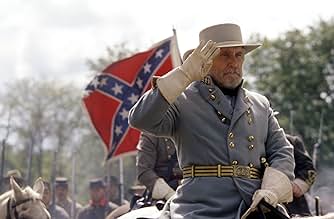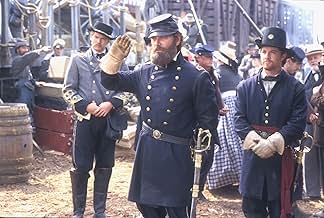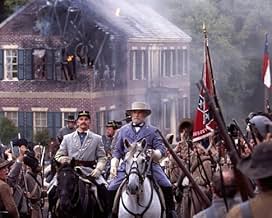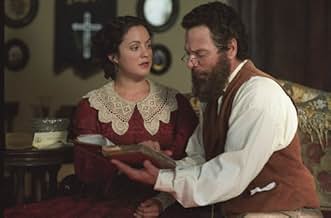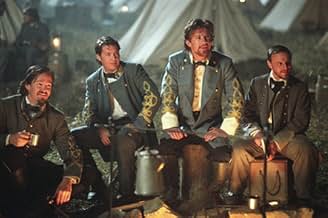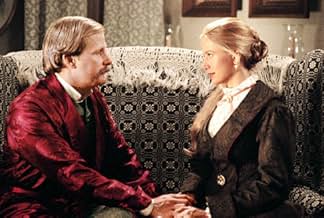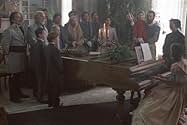Ajouter une intrigue dans votre langueThe rise and fall of confederate general Thomas "Stonewall" Jackson, as he meets with military success against the Union from 1861 to 1863, when he is accidentally killed by his own soldiers... Tout lireThe rise and fall of confederate general Thomas "Stonewall" Jackson, as he meets with military success against the Union from 1861 to 1863, when he is accidentally killed by his own soldiers.The rise and fall of confederate general Thomas "Stonewall" Jackson, as he meets with military success against the Union from 1861 to 1863, when he is accidentally killed by his own soldiers.
- Réalisation
- Scénario
- Casting principal
- Récompenses
- 1 victoire et 4 nominations au total
- Gen. James Kemper
- (as Royce Applegate)
- Confederate General
- (as Robert C. Byrd)
Avis à la une
`Gods and Generals,' which begins right after the firing on Fort Sumter and ends shortly before the Battle of Gettysburg, is the first part of a planned trilogy. Despite a handful of `name' players in the cast (Robert Duvall, Jeff Daniels, Mira Sorvino and even Ted Turner in a ludicrous cameo appearance), writer/director Ronald F. Maxwell is unable to bring a single character in his film to convincing life (with the possible exception of `Stonewall' Jackson, who gets to carry the burden of what little drama the film has almost single-handedly). In lieu of dialogue, the actors spend most of their time looking wistfully up to heaven or scanning the mist-shrouded horizon while delivering endless homilies about the rightness of the cause and the place of God in human affairs. To keep it all palatable for more enlightened and egalitarian-minded modern audiences, the filmmakers are quick to have the Southern characters declare that, even though the South is forced to fight against the North to protect its God-given right to sovereignty, they, as individuals, are all personally opposed to slavery as an institution and firmly believe that their resident blacks will be freed someday as a matter of course. Hell, the Northerners in this film seem more prejudiced against black people than the Southerners, who just can't say enough good things about their sycophantic slaves.
The battle scenes, though well staged and appropriately graphic in nature, are strangely unmoving, primarily because we have no emotional stake in any of the characters we see doing the fighting. Without anyone for us to focus on and care about, the audience becomes little more than curious bystanders, passive and unengaged observers of this brutal display of ritualized slaughter. Although the visuals are splendid throughout, the musical score, except in a few places, is like a thick, heavy syrup poured over the entire film.
By providing subtitled identification of the principal people, places, dates and battles, `Gods and Generals' does provide a service as a history lesson of sorts. As a drama, however, the film is woefully lacking in every way imaginable. `Gods and Generals' may thrill the heart of the diehard Civil War buff. The rest of us will have to stick to our dreams of Scarlett and Rhett, and of a romanticized vision of the South that only a Golden Age Hollywood mogul would have dared come up with.
Yep, that's just what you might believe. If you took history from this film.
Gods and Generals is a confused, heavily pro-Confederate, train wreck. It attempts to span two years of the war though the perspective of General Thomas "Stonewall" Jackson, arguably one of the most brilliant field commanders West Point has ever produced. Like it's antecedent Gettysburg it is of epic length except that Gettysburg actually made sense. This film is all over the place. Focuses on non-pivotal battles and is bloated with nonsensical dialog and close ups of men talking to themselves in archaic,sanctimonious, soliloquies. There are no issues, there are no cassus belli,no internal conflicts, there is only a clumsy even bizarre celebration of the confederacy; depicted as an embattled yet righteous society defending their way of life against their tyrannical northern overlords. There is one mention of Fort Sumter, a passing nod or two to slavery, and the rest is the Lee/Jackson traveling show. Overall a sloppy production which screams lousy direction and lack of focus. I felt the book told the story of Jackson in much more coherent style than this mess.
To it's credit, it does have very graphic and disturbing battle scenes where both sides are, at times, honored and portrayed with equanimity.
However, G&G, like Gettysburg (a MUCH better directed film), had potential to evenly instruct and entertain. That's where the similarities between the two films ends Gods and generals is a ponderous, rambling, confusing, tribute to the CSA. Aside from it's endless length it jumps around way too much, lacks proper character development and historical veracity, which is far too extensive to get into for the purposes of a review. I will say that Stephen Lang was magnificent as Jackson, but I wasn't terribly impressed with Robert Duvall as Lee. It is no wonder it bombed at the box office. It's just not very watchable, at least not in one sitting. It might be of interest to those, like myself, who are interested in civil war films. This one is a grave disappointment.
I can go on and on, but for me, it falls apart with the sophomoric writing. I counted at least a dozen instances where they shoehorned in actual quotes from these historical figures into places where they made no sense. They even have characters steal each other's quotes which made me LOL hard a few times. Its distracting!
In fact, this entire script is just one scene after another which are structured around famous quotes. The worst example is JEB Stuart, quite literally out of no where, ending a scene with Stonewall Jackson saying "Oh by the way (even though this is very off topic and you did not ask), I will always tell my men to gallop toward the enemy, and trot away". Its stuff like that which makes this movie unbearable, especially when compared to Gettysburg, which had "some" of that but was balanced out by actual character arcs, impressive direction of masses of reenactors, and an A list cast which acted that entire film masterfully, e.g. Sheen, Berringer, Lang, and especially Richard Jordan r.i.p. Gettysburg was able to masterfully (probably in editing phase) take situations before and during the battle to shape a properly structured, easy to follow story despite there being 50+ main characters.
Gods and Generals is just a mess, the complete opposite. I totally understand the propensity for civil war buffs (like myself) to give this a high score (look how many 10 stars skew the results), but, I say quite literally the opposite, because we're civil war buffs we deserve a better film that isn't a mess.
10/10 stars? Is this as good as Glory? Gone with the Wind? Or even Cold Mountain?
What I liked about the movie: I thought Lang did an excellent job portraying Jackson. I was deeply moved by his final scene in the film.
The attention to detail was good; overall it was historically accurate--with some exceptions.
The costumes looked good.
I appreciated the show of how Christianity influenced many in the Civil War, such as Jackson and Lee.
I liked the fact that many from Gettysburg reprised their roles in this film, although there were some who couldn't, which was a little disappointing.
What I didn't like or wished was better about the movie: The fake beards were more than obvious in this film, with the exception of Jackson's and Lee's, but this is relatively minor to the overall film.
I thought, with maybe the exception of the Fredericksburg battle, the depiction of the battle scenes were not nearly as well done as in Gettysburg; but to be fair, there were more battles to cover in this film. Gettysburg only had one, meaning more time could be given to the details of the battle.
The battle of Antietam was not in the movie at all, not even mentioned, which is very disappointing given its significance and effects.
Some of the CGI is poorly done (i.e., very obvious), but, again, this is a small part of the movie and in my opinion neither makes nor breaks it.
Some of the speeches were a bit stiff and seemed contrived, particularly Chamberlain's speech before the battle of Fredricksburg.
Not enough time was given to developing the characters of Lee, Chamberlain, and Hancock, all of whom are important in the novel. In fact, in contrast to the film, the novel gives most time to Lee, not Jackson. To be fair, however, novels usually are better than their film counterparts given the constraints of time.
My thoughts on some of the common complaints about the movie: Some complain there wasn't enough realism as to the carnage of war. To that I say there was enough to get the point across, and for myself, it is refreshing from time to time to see a movie that doesn't rely too heavily on blood and guts. This is not meant to be a blood and guts movie. The novel is even less bloody. Anyone who wants to see a blood and guts war movie should buy or rent Saving Private Ryan, Full Metal Jacket, Hamburger Hill, the Patriot, Braveheart, etc.
Others complain that there were too many poetic speeches. Indeed there were many speeches, but that was also true of Gettysburg, which most view as a good movie. I didn't mind the speeches so much other than they sometimes truncated the character in such a way that the audience fails to see their visceral humanity. As stated above, the only speech I thought was a bit over the top was Chamberlain's before the battle of Fredricksburg. It seemed forced, showy, and odd that the whole regiment would stand motionless and quiet for so long to hear him go on and on. Clearly it was intended to be a poignant moment showing historical parallels between the American Civil War and Roman history. But the whole scene ends up feeling staged and apathetic.
Others complain about the strong emphasis on religion. As stated above, I found this emphasis refreshing, for certainly Jackson and Lee were very devout Christian men. Christianity was a part of the ethos of this country at that time and affected many in both north and south.
Still others complain about the pro-southern perspective being so strong. While I admit there is an imbalance between the northern and southern perspectives, which clearly favors the southern view, I also think this only stands to reason, since the overall focus of the film is clearly on Jackson, a southerner. And given the fact that many other movies often underplay the southern perspective (i.e., it was fought over State's rights) or ignore it altogether, some will find this movie's emphasis a refreshing change. On the other hand, the clear downplay of the role and effect of slavery in this film will no doubt trouble many Americans.
Finally, others complain that the movie is too long. But I find this to be a misnomer. What most really mean by this is that the movie is not entertaining enough to justify such a length. This is not the first long film in cinematic history. Other films were very long and yet praised as wonderful (Terms of Endearment, Dances With Wolves, Gone with the Wind, Braveheart, Lord of the Rings, etc.). The real issue here, I believe, is that this movie for many is too "slow" or "mundane" in their estimation. This, I think, is a result of our becoming so accustomed to roller coaster rides at the movies. If it isn't constantly exciting or humorous or action-packed, it needs to be short. I suppose that in a TV age wherein we are accustom to pure entertainment compacted into ten-minute blocks of time separated by pithy, entertaining commercials, this complaint ought not surprise us, given the historical orientation of this film. But I think such a complaint is evidence of a deeper cultural problem, which should concern us all.
My opinion who will like this movie: many Historians, Teachers, and Homeschooling parents; most southerners; Civil War reenactors; many Christians.
My opinion who will not like this movie: Most northerners, most African Americans, many Liberals, most in Hollywood.
My opinion on how the movie will fare: It will likely not last long in the theaters. Most critics will hate it. It will come out on DVD/Home video sooner than most movies. It will likely not rake in as much money as it cost to make. However, I hope to be proven wrong here. Though not without flaws, I believe it is worth seeing and discussing.
What's very impressive about this movie was (1) not overdone violence; (2) beautiful cinematography; (3) an unusual and refreshing reverence for God, the Bible and Christian thought and (4) a better portrayal by Robert Duvall of Robert E. Lee than Martin Sheen's version in "Gettsyburg." On the point 3, all it was - to those atheists/agnostics who were offended by Jackson's reverence - was showing an accurate portrayal of how people thought and believed back then in the south. That's simply the way it was and the way people viewed everyday life, though Biblical standards and language. So kudos, to the filmmakers here for at least giving us an accurate description of the times, even though they probably don't share those beliefs. Of course, the critics - almost all of them secular - hated the film.
One thing I did miss from "Gettysburg" was a bigger role from Jeff Daniels, who was so good as "Col.Chamberlain." His role here in that capacity is limited.
In summary, an accurate film with ideals and worthy of anyone's collection, particularly if they are Civil War buffs, but a movie that needed more punch to it to be more "watchable."
Le saviez-vous
- AnecdotesSome scenes were filmed on Robert Duvall's estate in Virginia, which was the site of some Civil War skirmishes.
- GaffesRobert Edward Lee and Thomas Jonathan Jackson are shown wearing full beards at the very start of the Civil War, but they did not look like this until sometime later. Lee had dark hair going gray and wore a drooping mustache of the type favored by army officers in the 1850s. He grew his well known beard while serving as Jefferson Davis's military advisor. Jackson was clean shaven and grew a beard later out of his well known disinterest in personal grooming and appearance.
- Citations
Joshua Lawrence Chamberlain: All these thousands of men. Many of them not much more than boys. Each one of them some mother's son, some sister's brother, some daughter's father. Each one of them a whole person loved and cherished in some home far away. Many of them will never return. An army is power. Its entire purpose is to coerce others. This power can not be used carelessly or recklessly. This power can do great harm. We have seen more suffering than any man should ever see, and if there is going to be an end to it, it must be an end that justifies the cost. Now, somewhere out there is the Confederate army. They claim they are fighting for their independence, for their freedom. Now, I can not question their integrity. I believe they are wrong but I can not question it. But I do question a system that defends its own freedom while it denies it to an entire race of men. I will admit it, Tom. War is a scourge, but so is slavery. It is the systematic coercion of one group of men over another. It has been around since the book of Genesis. It exists in every corner of the world, but that is no excuse for us to tolerate it here when we find it right infront of our very eyes in our own country. As God as my witness, there is no one I hold in my heart dearer than you. But if your life, or mine,is part of the price to end this curse and free the Negro, then let God's work be done.
- Crédits fousNo reenactors were credited individualy, rather there was general thank you to all the reenactors who participated in the filming.
- Versions alternativesThe Director's Cut of the film includes additional action scenes from the Battle of Antietam. The battle scenes are shown from the perspectives of Jackson and Chamberlain, and mostly focus on the fighting in Miller's Cornfield which was a major deciding point of the battle.
- ConnexionsFeatured in Bob Dylan: Cross the Green Mountain (2003)
Meilleurs choix
- How long is Gods and Generals?Alimenté par Alexa
Détails
- Date de sortie
- Pays d’origine
- Langue
- Aussi connu sous le nom de
- Các Vị Thần Và Những Tướng Quân
- Lieux de tournage
- Sociétés de production
- Voir plus de crédits d'entreprise sur IMDbPro
Box-office
- Budget
- 56 000 000 $US (estimé)
- Montant brut aux États-Unis et au Canada
- 12 882 934 $US
- Week-end de sortie aux États-Unis et au Canada
- 4 675 246 $US
- 23 févr. 2003
- Montant brut mondial
- 12 923 936 $US
- Durée3 heures 39 minutes
- Couleur
- Mixage
- Rapport de forme
- 2.39 : 1
Contribuer à cette page








